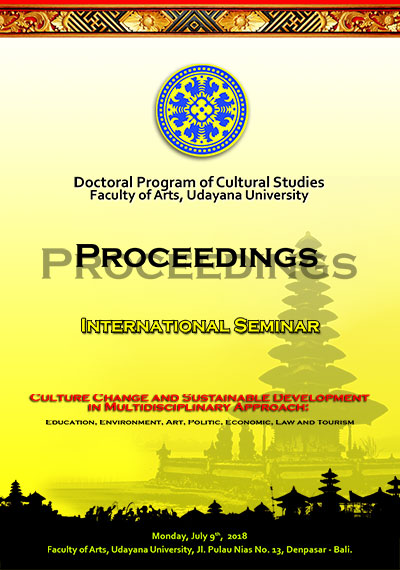SUSTAINABLE DEVELOPMENT AND LEGAL TOURISM: READING SUSTAINABLE DEVELOPMENT PRINCIPLES IN BALI PROVINCIAL LEGISLATION ON TOURISM
Abstract
This paper intends to discuss the implementation of sustainable development in tourism law, with case examples Bali tourism legislation. The question to be answered is: (1) How does the Bali Provincial Legislation implement the principles of sustainable and environmentally sound development? (2) How to place the principle of sustainable development in the Principle of the Establishment of Good Legislations? The discussion is conducted using the method of legal science, including identifying, systematizing, and interpreting legal texts, producing a number of important statements as a final note. First, the principle of sustainable development or sustainable principle is used as a principle in the legislation, especially in Bali Province Regional Regulation No. 2 of 2012 and Bali Province Regional Regulation No. 10 of 2015. Its use in two forms, as a principle in the implementation of the Legislation and as a principle which is reflected in the content of the Laws and Regulations (Principles for the establishment of Good Material Lawful Rules). Second, the principle of sustainable development or sustainable principle does not exist either in Article 5 or Article 6 of Act Number 12 of 2011 regarding the principle of the establishment of good legislation. Particularly Article 6 Paragraph (2) of Act Number 12 of 2011, which enables "other principles in accordance with the field of law of the relevant Regulations", cannot be interpreted to exist in Article 6 paragraph (2), because of the principle of sustainable development or the principle of sustainability is reserved for the field of Regulation in general, not specific to a particular legal field, such as Environmental Law. Third, the habit of formulating legislation formulating the principle of sustainable development or sustainable principle needs to be continued, besides also need to consider to make it positive law as the principle of formation of a good constitution of material law (a principle which must be reflected in the content of Regulations).
Downloads
References
Attamimi, A. Hamid S. 1990. “Peranan Keputusan Presiden Republik Indonesia dalam Penyelenggaraan Pemerintahan Negara”, Disertasi. Jakarta: Fakultas Pascasarjana Universitas Indonesia.
Keraf, A. Sonny. 2014. Filsafa Lingkungan Hidup: Alam sebagai Sbuah Sistem Kehidupan Bersama Fritjf Capra. Penerbit PT Kanisius.
--------. 2006. Etika Lingkungan. Jakarta: Penerbit Buku Kompas. Koesnoe, Mohammad. 2010. Dasar dan Metode Ilmu Hukum Positif. Surabaya: Airlangga University Press.
Sidharta, B. Arief. 2013. Ilmu Hukum Indonesia: Upaya Pengembangan Ilmu Hukum Sistematik yang Responsif terhadap Perubahan Masyarakat, Bandung: Unpar Press.
Manan, Bagir. 2004. Hukum Positif Indonesia (Satu Kajian Teoritik). Yogyakarta: FH UII Press. Vlies, I.C. Van Der. 2005. Buku Pegangan Perancang Peraturan Perundang-undangan, terjemahan. Jakarta: Direktorat Jenderal Peraturan Perundangan-undangan Departemen Hukum dan Hak Asasi Manusia RI.





